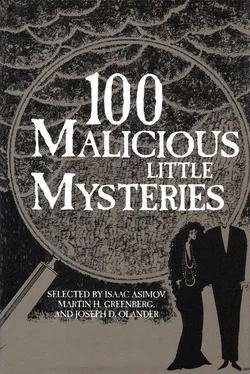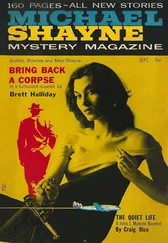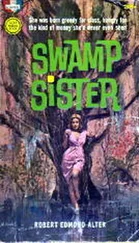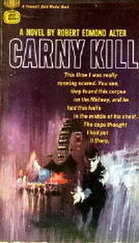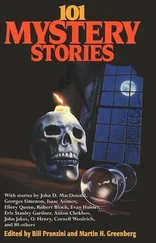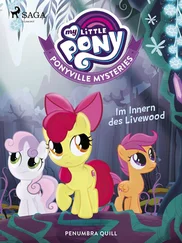Willis’ face had gone ashen white.
“That box you have with you, Willis. Mr. Boyd and another company man are coming in the front door now. And if it’s cash payments for all those company machines and supplies you and the shipping crew have been funneling off on the side, you’ll have to explain it to them.”
Her face was calm and serene — and smiling. Now she looked like what she really was — somebody’s sweet old grandmother.
Comes the Dawn
by Michael Kurland
The sun was just sending its slanting rays over the mountains to the East, etching the pattern of the adobe rooftops into the walls of the buildings across the street, when the first daylight patrol of the Guardias Municipales found the twisted body of what had been a man lying in the dust. At first they thought it was just another looter...
Civil insurrection, even in a country where it is almost the normal pattern of life, is always an ugly thing. Whether it is right or wrong, good or evil, necessary or irrelevant, it is the handmaiden of chaos. Looting, raping, fire, and death are always within its domain. Its borders spread, and are not sharp or distinct. Unconnected events are swept before it as flotsam before the ocean tide.
Manuel Hispoza Forgas had a brother. This brother’s name was Philippe. Manuel did not like Philippe; a feeling which was reciprocated. These brothers lived in widely separate parts of the city and saw each other but seldom. Philippe’s dislike for his brother remained fairly constant through the passing years, he preferred to just not ever think about Manuel. Manuel’s feeling festered and grew into a supreme, blinding hatred; he could not help but think about Philippe constantly.
Philippe and Manuel shared jointly in their father’s estate. Philippe prospered with his portion, establishing a small furniture shop which grew into a major store over the years. Manuel tended to try more speculative ventures: mostly at the racetrack and cockfight. As Philippe’s fortunes rose, Manuel’s fell; and Manuel’s dislike of his brother increased.
It is incidental, perhaps, that Philippe married the very girl that Manuel, on afterthought, decided he would have liked to marry. It is predicatable that, of all the houses in the city, Manuel was most fond of the one in which Philippe happened to live.
Manuel’s hatred of his brother drove him to thoughts of murder. Shooting, strangulation, poison, defenestration; murder by axe, knife, car; all these fancies and more took up a large part of his imagination. He planned accidental deaths, locked room murders, and murders of passion. He read detective stories, true crime books, and medical journals. He became cognizant of every famous killer from Cain to Torquemada, from Richard III to Lizzie Borden. That he restrained from committing that most horrible and fascinating of all crimes can be attributed only to one fact — Manuel’s extreme cowardice. These famous murderers, Manuel would reflect when reading about Mrs. Simms or Doctor Crippen, became famous not because they committed murder, but because they got caught. Manuel didn’t have a very high regard for the local police, but if there were the slightest chance — however small — of hanging for his crime, Manuel would keep it a secret dream.
The wonderful idea came to Manuel on the second day of the insurrection. On the evening of the third day he went to find Philippe to tell him about it. Philippe, who as usual was working late in his store after the clerks had gone home, let Manuel in when he knocked.
“You want something?” Philippe asked.
“Don’t be unfriendly,” Manuel replied. “I’ve come here this evening out of concern for you. The riots in this part of the city are horrible: looting, burning, killing.”
“I’m touched that you have such concern for me,” Philippe commented, and went back to his desk. “But you could have seen me at the house, I have to be leaving soon.”
“Ah, yes. The curfew starts shortly, doesn’t it?” Manuel asked.
“It does. And I don’t want to have to spend the night here.”
“If the riots start again tonight, aren’t you afraid the store will be looted, or perhaps burned?”
“I should think that would please you,” Philippe commented. “I think the Giuirdias Municipales have the situation well under control. Besides, I carry heavy insurance.”
“Ah!” Manuel shrugged. “Insurance, of course.” He sat down on the desk Philippe was working at, and leaned over Philippe. “Before you leave,” he said, “I want to tell you of the brilliant idea I had yesterday. I’ve been thinking about it for two days, and it seems perfect. Perhaps you can find a flaw in it?”
Philippe threw down his pencil. “You’re sitting right on the papers I’ve been trying to work on. I don’t give a fig for your ideas — get up and get out of here!”
“Ah, but this idea concerns you,” Manuel said. He took a large, heavy revolver from under his shirt, and pointed it at his brother.
Philippe jumped up, upsetting his chair. “What’s this?” he demanded shrilly.
“A revolver,” Manuel told him. “It’s quite old, but I think it will work. I’m going to kill you with it.”
Philippe straightened the chair, and sat down again: slowly, as though he were sitting on a case of eggs. “Kill me? You wish to kill me?”
“I’ve wished nothing else for many years.”
“They’ll hang you,” Philippe said.
“I think not,” Manuel answered. “And I’ve been thinking about it quite a lot. Let me explain.”
“You’re insane,” Philippe said.
Manuel went on as if he hadn’t heard. “The trouble, of course, is the police,” he explained. “They find a body, and they start searching for a murderer. They check for clues; they try to find witnesses; they try to establish a motive. They slowly close their net until they find their killer. It is almost inevitable.”
“Yes, yes. Inevitable. If you kill me, they will find you and hang you.” Philippe pounced on the thought. “You don’t want to be hanged. Now leave here, and we’ll forget all about it. I promise you, I shall not say a—”
“The trick,” Manuel went on, as if his brother had said nothing, “is to stop this process before it starts. And I’ve found a way. It came to me while I was listening to the radio. It’s a clever idea, but very simple. What bodies do they find that do not cause them to search for a murderer?”
Philippe said nothing.
“I will tell you. Now, in this part of the city, during the riots, there is much looting going on at night. The Guardias shoot anyone they find looting. Such bodies are buried without question. If one of the bodies happens to be the owner of a store instead of a looter, a regrettable mistake has been made, and that is the end of it. You see how simple it is?”
Manuel took the revolver in both hands and pointed it at his brother’s head. “Bang,” he said.
“You’re crazy,” Philippe said, starting to shake uncontrollably.
“You see something wrong with the plan?” Manuel asked.
“They’ll hang you.”
“How are they going to catch me?”
Philippe did not answer.
“Turn around,” Manuel said.
“What?”
“Turn around. I’m going to tie you up. When I hear some shooting, so I know the Guardias are out, I’m going to drag you outside. Then, bang! The Guardias never come up the street to see the looters they’ve shot until morning, for fear of ambush, so you’ll lie there until daylight. Of course, I’ll untie you before I leave. Regrettable accident. I shall cry when I hear the news.”
Manuel tied and gagged his brother with rags that wouldn’t leave marks, and continued sitting on the desk staring at Philippe. Philippe tried to meet his brother’s stare with a defiant look. “Bang,” Manuel said softly, and Philippe looked away.
Читать дальше
